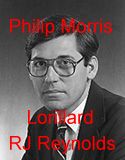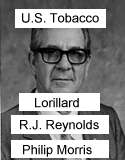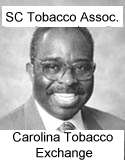 | The S.C. Legislature's Nicotine Addiction |  |
 | The S.C. Legislature's Nicotine Addiction |  |
South Carolina's #1 killer is chemical addiction to smoking nicotine. Harder to quit than heroin or cocaine, nicotine is so highly addictive that each year more than 6,000 of our citizens smoke themselves to death, each an average of 15.3 years early. In order to maintain profit levels in the face of such a massive annual kill-off the tobacco industry must create a political climate willing to tolerate allowing 18,000 additional S.C. children and teens to become permanent slaves to nicotine.
In that each South Carolina legislator raised their hand and took an oath to protect the public health, what tobacco control protections have they enacted to insulate our children from those seeking to chemically enslave them? What steps have they taken to help our more than 700,000 nicotine dependent citizens break nicotine's control over the flow of more than two hundred of their body's neurochemicals? Absolutely none!
 Instead, the nicotine addiction industry plays the S.C. legislature -- a body dripping in blood money -- like some fine fiddle. They know that as long as they control key committees and leadership that it will be business as usual in South Carolina.
Instead, the nicotine addiction industry plays the S.C. legislature -- a body dripping in blood money -- like some fine fiddle. They know that as long as they control key committees and leadership that it will be business as usual in South Carolina.
As hard as it may be to believe, of the 87 Representatives and 41 Senators who have served in the legislature since 2000, 67% in the House and 51% in the Senate have accepted "direct" campaign contributions from those doing the killing. But it's really much worse than that.
A significant percentage of lawmakers are accepting "indirect" nicotine revenues that are being laundered by passing through their party's House or Senate caucus committee. Here an additional $85,000 in indirect tobacco contributions were mixed with clean contributions. Factoring in those accepting these funds, since 2000, 81.6% of Representatives and 85.4% of Senators have knowingly accepted a portion of the nicotine industry's S.C. profits.
The below identified legislators reflect only those accepting "direct" contributions. These lawmakers cannot escape the reality that a portion of the funds they took were derived from nicotine sales to addicted children and teens that they swore to protect. They cannot deny that a portion of the money they pocketed was paid by the 6,000 South Carolinians who lost their lives because those charged with protecting the public health ignored their dying. They cannot deny that each and every dollar is soaked in dependency, disease, decay, dying and death.

To the right is a picture of Senator Glenn F. McConnell, the President Pro Tempore of the Senate and arguably our state's most powerful legislator. In that he has just accepted another round of tobacco industry contributions (R.J. Reynolds during 2004, Lorillard Tobacco Company on 01/25/04 and Philip Morris on 12/28/03) and has done so since at least 1985 (see page 15), his position as "the leader" among leaders should concern all concerned with S.C. public health, as he will again owe a portion of his re-election to the nicotine addiction business.
Will tobacco kill more South Carolinians during 2004 than killed in battle during the entire Civil War? Under Senator McConnell's 2004 Senate and Judicial Committee leadership a new law (long on the tobacco industry's prize list) was enacted officially establishing the South Carolina Tobacco Museum for the stated purpose of preserving our "rich heritage of tobacco culture." Will the museum tell the whole truth or only select facts while using our state's name as advertising to help entice additional youth and young adults to sample what may be earth's most addictive chemical?
Will Senator McConnell's legacy be that he was skilled at using history and power to enslave and cut short the dreams of tens of thousands of youth and young adults? What about their heritage? What heart would argue a need to chemically enslave them in order to create or preserve a nicotine sales job? What love would say, "it was legal to hook them, we could, so we did." What sick mind and warped logic would deny 700,000 South Carolinians neurochemical freedom from smoking nicotine (dooming roughly half to early graves) by asserting that to tax them and use the revenues to fund effective avenues of escape would violate an oath of "no new taxes"?
Below are the twenty members of the South Carolina legislature who have accepted the most nicotine addiction dollars since 2000. Campaign disclosure statements for 2004 are not yet available online and the below rankings were made using 2000 and 2002 financial data provided by FollowTheMoney.org.
 #16 - Representative | |
 #17 - Representative | |

The next time you see a child or teen smoking think about "leaders" who have no moral or ethical concerns about accepting part of the money that the child spent in becoming addicted. The next time you hear about a friend or neighbor who smoked themselves to death, picture the politicians who intentionally discriminated in not spending one thin dime to provide those addicted to a legal drug with effective local treatment options, while spending tens of millions on effective local treatment options for those addicted to illegal drugs.
 If those selling illegal drugs were permitted to make political campaign contributions, do you think we'd have effective treatment programs to help their captive customers break free? It makes you wonder.
If those selling illegal drugs were permitted to make political campaign contributions, do you think we'd have effective treatment programs to help their captive customers break free? It makes you wonder.
This page exists so that "we the people" can hold our legislators fully accountable for South Carolina being at or near the bottom of the barrel in almost all smoking, life expectancy, and health statistics categories. It didn't happen by chance. They took an oath to protect us and far too many have chosen betrayal.
The above pictures and the below names will remain on this page until they either pledge to stop accepting contributions from those doing the killing or demonstrate a serious commitment toward nicotine dependency prevention and cessation in South Carolina.
Profit sharing following successful use of a true weapon of mass destruction, the below additional S.C. legislators felt the need to accept "direct" nicotine addiction industry campaign contributions since 2000, a period during which 30,000 of our neighbors lost their lives to smoking. Love of neighbor or love of $$$?
| Senator Thomas C. Alexander | Finance Committee | R.J. Reynolds |
| Senator William S. Branton, Jr. | Finance/Medical Affairs | R.J. Reynolds |
| Senator Dick Elliott | Agriculture/Judiciary | Philip Morris/R.J. Reynolds |
| Senator Robert Ford | Judiciary Committee | R.J. Reynolds |
| Senator Lawrence K. Grooms | Medical Affairs Committee | R.J. Reynolds |
| Senator C. Bradley Hutto | Medical Affairs Committee | R.J. Reynolds |
| Senator John M. Knotts, Jr. | Judiciary/Agriculture | Philip Morris/R.J. Reynolds |
| Senator Harvey S. Peeler, Jr. | Chairman Medical Affairs Comm. | Southern Tobacco/R.J. Reynolds |
| Senator Glenn G. Reese | Finance Committee | Lorillard Tobacco |
| Senator James H. Ritchie | Medical Affairs Committee | R.J. Reynolds |
| Senator Nikki G. Setzler | Finance Committee | SC Tobacco Assn/R.J. Reynolds |
| Senator Linda H. Short | Medical Affairs/Education | Philip Morris |
| Senator J. Verne Smith | Medical Affairs Committee | R.J. Reynolds |
| Rep. John Graham Altman | Judiciary Committee | R.J. Reynolds |
| Rep. George Hampton Bailey | Agriculture Committee | Lorillard/Brown & Williamson |
| Rep. Kenneth A. Bingham | Commerce & Industry Committee | R.J. Reynolds |
| Rep. William K. Bowers | Commerce & Industry Committee | Philip Morris/R.J. Reynolds |
| Rep. Grady A. Brown | Commerce & Industry Committee | Philip Morris |
| Rep. Joe E. Brown | Chairman Medical Affairs Comm. | Philip Morris/R.J. Reynolds |
| Rep. Catherine C. Ceips | Medical Affairs Committee | R.J. Reynolds |
| Rep. Converse A. Chellis III | Chairman Rules Committee | R.J. Reynolds |
| Rep. Alan D. Clemmons | 2nd Vice Chair Judiciary | R.J. Reynolds |
| Rep. Marty W. Coates | 2nd Vice Chair Agriculture | R.J. Reynolds |
| Rep. Gilda Cobb-Hunter | Ways & Means Committee | Philip Morris/R.J. Reynolds/B&W |
| Rep. Daniel T. Cooper | Ways & Means Committee | R.J. Reynolds |
| Rep. Jeffrey D. Duncan | Agriculture Committee | R.J. Reynolds |
| Rep. Eldridge R. Emory | Agriculture Committee | Philip Morris |
| Rep. Marion B. Frye | Agriculture Committee | R.J. Reynolds |
| Rep. JoAnne Gilham | Education Committee | R.J. Reynolds |
| Rep. C. Alexander Harvin III | Ways & Means Committee | R.J. Reynolds |
| Rep. Jesse E. Hines | 2nd Vice Chair Education | SC Tobacco Association |
| Rep. Shirley R. Hinson | Ways & Means Committee | R.J. Reynolds |
| Rep. Chip Huggins | Commerce & Industry Committee | R.J. Reynolds |
| Rep. Thomas G. Keegan | 2nd Vice Chair Ways & Means | R.J. Reynolds |
| Rep. Brenda Lee | 2nd Vice Chair Commerce | Philip Morris |
| Rep. Harry B. Limehouse III | Ways & Means Committee | Philip Morris/R.J. Reynolds |
| Rep. Lanny F. Littlejohn | Ways & Means Committee | U.S. Tobacco |
| Rep. Walter P. Lloyd | Education Committee | U.S. Tobacco |
| Rep. Dwight A. Loftis | Agriculture Committee | R.J. Reynolds |
| Rep. James H. Lucas | Judiciary | SC Tobacco Assn./R.J. Reynolds |
| Rep. David J. Mack III | Medical Affairs Committee | U.S. Tobacco |
| Rep. Becky Rogers Martin | Education Committee | R.J. Reynolds |
| Rep. E. DeWitt McCraw | Ways & Means Committee | Philip Morris/B&W/R.J. Reynolds |
| Rep. James G. "Jim" McGee III | Ways & Means Committee | R.J. Reynolds |
| Rep. James H. Merrill | Judiciary Committee | R.J. Reynolds |
| Rep. Harry L. Ott, Jr. | Agriculture Committee | Philip Morris/US Tobacco/Lorillard |
| Rep. Phillip D. Owens | Education Committee | R.J. Reynolds |
| Rep. Robert S. Perry, Jr. | Agriculture Committee | U.S. Tobacco/Lorillard |
| Rep. Lewis E. Pinson | Education Committee | R.J. Reynolds |
| Rep. Michael A. Pitts | Medical Affairs Committee | R.J. Reynolds |
| Rep. Richard M. Quinn, Jr. | Majority Leader/Ways & Means | Lorillard/Brown & Williamson |
| Rep. Becky D. Richardson | Commerce & Industry Committee | Southern Tobacco |
| Rep. J. Todd Rutherford | Judiciary Committee | Philip Morris |
| Rep. William E. Sandifer III | Commerce & Industry Committee | R.J. Reynolds |
| Rep. Wallace B. Scarborough | Commerce & Industry | R.J. Reynolds |
| Rep. John L. Scott, Jr. | Judiciary Committee | U.S. Tobacco |
| Rep. J. Gary Simrill | Judiciary/Vice Chair Rules | R.J. Reynolds |
| Rep. Fletcher N. Smith, Jr. | Judiciary Committee | R.J. Reynolds |
| Rep. G. Murrell Smith, Jr. | 1st Vice Chair Judiciary | R.J. Reynolds |
| Rep. James E. Smith, Jr. | Minority Leader/Judiciary | Brown & Williamson |
| Rep. W. Douglas Smith | Speaker Pro Tempore | Philip Morris/Lorillard |
| Rep. John J. Snow | Chairman Agriculture Comm. | B&W/Lorillard/RJR/SCTA |
| Rep. Harry C. Stille | Education Committee | R.J. Reynolds |
| Rep. J. Adam Taylor | Judiciary Committee | R.J. Reynolds |
| Rep. Ronald P. Townsend | Chairman Education Committee | Philip Morris |
| Rep. Daniel L. Tripp | Commerce & Industry Committee | Philip Morris |
| Rep. Teddy N. Trotter | Ways & Means Committee | R.J. Reynolds |
| Rep. Lewis R. Vaughn | Ways & Means Committee | Philip Morris |
| Rep. J. David Weeks | Judiciary Committee | Philip Morris/US Tobacco |
| Rep. W. Brian White | Secretary Medical Affairs Comm. | R.J. Reynolds |
I, John R. Polito, accept full and exclusive responsibility for all representations made on this page. This page's production and display has no association with any other person, organization or entity other than me. I relied upon the public records at FollowTheMoney.org, at TobaccoDocuments.org and at scstatehouse.gov. Any error will be immediately corrected upon receipt of notice.
Any legislator can have their name immediately transferred from this wall of shame to a pledge wall by written or public promise to never again accept contributions from those profiting by chemically enslaving our youth and young adults and by destroying their health and shortening their lives.
John R. Polito
john@whyquit.com